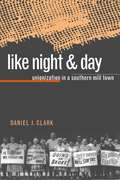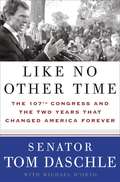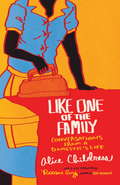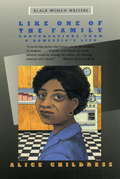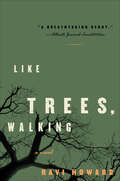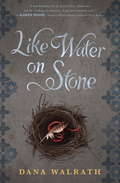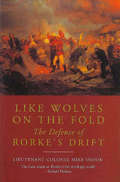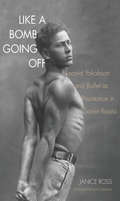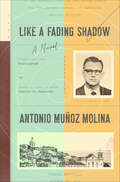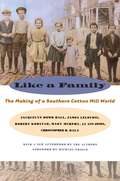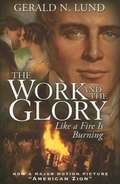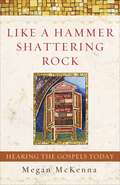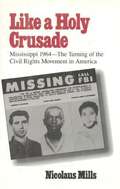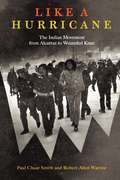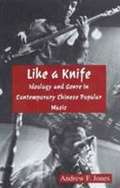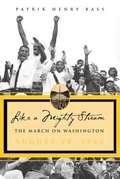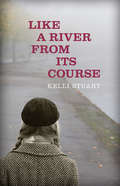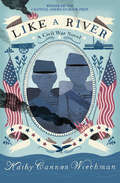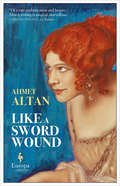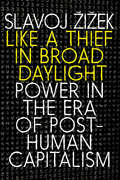- Table View
- List View
Like Night and Day: Unionization in a Southern Mill Town
by Daniel J. ClarkDaniel Clark demonstrates the dramatic impact unionization made on the lives of textile workers in Henderson, North Carolina, in the decade after World War II. Focusing on the Harriet and Henderson Cotton Mills, he shows that workers valued the Textile Workers Union of America for more than the higher wages and improved benefits it secured for them. Specifically, Clark points to the importance members placed on union-instituted grievance and arbitration procedures, which most labor historians have seen as impediments rather than improvements. From the signing of contracts in 1943 until a devastating strike fifteen years later, the union gave local workers the tools they needed to secure at least some measure of workplace autonomy and respect from their employer. Union-instituted grievance procedures were not without flaws, says Clark, but they were the linchpin of these efforts. When arbitration and grievance agreements collapsed in 1958, the result was the strike that ultimately broke the union. Based on complete access to company archives and transcripts of grievance hearings, this case study recasts our understanding of labor-management relations in the postwar South.
Like No Other
by Anna Jacobs1755. Rachel Smedling is not like the other women in her isolated Pennine village: she is taller, stronger and weaves cloth like a man. Without her, the household would fall apart, for her mother is ailing and her vicious drunkard father seems to hate her so much, he would happily offer money to any man who would wed her. When her mother dies, Rachel is at the mercy of her increasingly violent father. Her only escape is by marrying a kindly man with whom she finds happiness, if not passion, and her life begins to seem complete. Rachel's growing prosperity infuriates her father and his cronies, however, and they will stop at nothing to see her destroyed.
Like No Other
by Anna Jacobs1755. Rachel Smedling is not like the other women in her isolated Pennine village: she is taller, stronger and weaves cloth like a man. Without her, the household would fall apart, for her mother is ailing and her vicious drunkard father seems to hate her so much, he would happily offer money to any man who would wed her. When her mother dies, Rachel is at the mercy of her increasingly violent father. Her only escape is by marrying a kindly man with whom she finds happiness, if not passion, and her life begins to seem complete. Rachel's growing prosperity infuriates her father and his cronies, however, and they will stop at nothing to see her destroyed.
Like No Other
by Anna JacobsRachel Smedling is not like the other women in her isolated Pennine village: she is taller, stronger and weaves cloth like a man. Without her, the household would fall apart, for her mother is ailing and her vicious drunkard father seems to hate her so much, he would happily offer money to any man who would wed her. When her mother dies, Rachel is at the mercy of her increasingly violent father. Her only escape is by marrying a kindly man with whom she finds happiness, if not passion, and her life begins to seem complete. Rachel's growing prosperity infuriates her father and his cronies, however, and they will stop at nothing to see her destroyed.(P)2004 Isis Publishing Ltd
Like No Other Lover
by Julie Anne LongNow or Never. . . It's the last chance for Cynthia Brightly, the ton's most bewitching belle. Driven out of London by a secret scandal, she must find a grand husband at the Redmonds' house party before word of her downfall spreads all over England. Unfortunately, someone at Pennyroyal Green is already privy to the whispers of broken engagements and dueling lovers: Miles Redmond, renowned explorer and-thanks to his brother's disappearance-heir to the family's enormous fortune. Miles set his sights on Cynthia once, at a time when the ambitious beauty thought herself too good for a second son. But now he's heir apparent, relishing his control. He strikes a bargain with her: he'll keep Cynthia's steamy secrets and help her find a husband among the guests-in exchange for a single kiss. What could be the harm in a simple kiss? Cynthia is about to discover that it's enough to unleash fierce passion-and that Miles Redmond is most certainly like no other lover in the world.
Like No Other Time: The 107th Congress and the Two Years That Changed America Forever
by Tom Daschle Michael D'OrsoTom Daschle, the Majority Leader of the historic 107th Senate, presents a candid insider’s account of the workings of the U.S. government during two of the most tumultuous years in the nation’s history.The 107th Congress faced a time like no other in the life of the nation. This was the era of the first presidential election to be decided by the United States Supreme Court, the fifty-fifty Senate, the horror of September 11, the anthrax attacks on media and the government (including Daschle’s own office), the war on terrorism, corporate scandals that shook the economy, the inexorable move toward war with Iraq, and other dramatic events, all leading up to the historic midterm elections of 2002.Through it all, Senator Tom Daschle had, with the exception of the President, the most privileged view of these unfolding developments, both in front of and behind the closed doors of government. In Like No Other Time, Daschle offers a riveting account of his singular perspective on a time when the nation faced deadly and elusive external enemies and a level of domestic political contention rarely seen in American history. Senator Daschle is un-flinching in his impressions of the key political figures of our time from both parties. The result is an acutely perceptive assessment of how our government met—and sometimes did not meet—the challenges of a remarkable era.As it was during the years of the 107th Congress, the United States is once again at a critical and historic crossroads. Our choices, based on what we have learned from our recent past, will affect our future in profound ways. For Senator Daschle, the first and perhaps most important choice lies with what kind of representation and leadership we want in government. It is a choice between a political party with a core philosophical belief in the power of our collective will to confront these challenges through our government, and one dominated by a group of people who don’t like and don’t believe in government.
Like One of The Family
by Alice ChildressA new edition of Alice Childress’s classic novel about African American domestic workers, featuring a foreword by Roxane GayFirst published in Paul Robeson’s newspaper, Freedom, and composed of a series of conversations between Mildred, a black domestic, and her friend Marge, Like One of the Family is a wry, incisive portrait of working women in Harlem in the 1950’s. Rippling with satire and humor, Mildred’s outspoken accounts vividly capture her white employers’ complacency and condescension—and their startled reactions to a maid who speaks her mind and refuses to exchange dignity for pay.Upon publication the book sparked a critique of working conditions, laying the groundwork for the contemporary domestic worker movement. Although she was critically praised, Childress’s uncompromising politics and unflinching depictions of racism, classism, and sexism relegated her to the fringe of American literature. Like One of the Family has been long overlooked, but this new edition, featuring a foreword by best-selling author Roxane Gay, will introduce Childress to a new generation.
Like One of the Family: Conversations from a Domestic's Life
by Alice ChildressLike One of the Family, which provides historical context for Kathryn Stockett's novel, The Help, is comprised of a series of conversations between Mildred, a black domestic, and her friend Marge. They create a vibrant picture of the life of a black working woman in New York in the 1950s.Rippling with satire and humor, Mildred’s outspoken accounts capture vividly her white employers’ complacency and condescension—and startled reactions to a maid who speaks her mind. As Mildred declares to a patronizing employer that she is not just like one of the family, or explains to Marge how a tricky employer has created a system of “half days off” to cheat her help, we gain a glimpse not only of one woman’s day to day struggle, but of her previous ache of racial oppression. A domestic who refuses to exchange dignity for pay, Mildred is an inspiring conversationalist, a dragon slayer in a segregated world. The conversations in the book were first published in Freedom, the newspaper edited by Paul Robeson, and later in the Baltimore Afro-American. The book was originally published in the 1950s by in Brooklyn–based Independence Press, and Beacon Press brought out a new edition of it in 1986 with an introduction by the literary and cultural critic Trudier Harris.
Like Trees, Walking: A Novel
by Ravi HowardBased on the true story of a modern-day lynching in America, Ravi Howard's widely acclaimed debut novel exposes one of the most tragic chapters in the history of the American South.On the morning of March 21, 1981, in Mobile, Alabama, nineteen-year-old Michael Donald was found dead, his body badly beaten and hanging from a tree on Herndon Avenue. Brothers Paul and Roy Deacon of the Deacon Memorial Funeral Home are called upon to bury their close friend and classmate, and the experience will leave them forever changed. Along with other residents of their hometown, the Deacon brothers must struggle to understand the circumstances surrounding Donald's murder—the city's first lynching in more than sixty years and a gruesome reminder of racial inequalities in the New South.
Like Water on Stone
by Dana Walrath"Evocative and hopeful," says Newbery Honor-Winner Rita Williams-Garcia of this intense survival story set during the Armenian genocide of 1915. It is 1914, and the Ottoman Empire is crumbling into violence. Beyond Anatolia, in the Armenian Highlands, Shahen Donabedian dreams of going to New York. Sosi, his twin sister, never wants to leave her home, especially now that she is in love. At first, only Papa, who counts Turks and Kurds among his closest friends, stands in Shahen's way. But when the Ottoman pashas set in motion their plans to eliminate all Armenians, neither twin has a choice. After a horrifying attack leaves them orphaned, they flee into the mountains, carrying their little sister, Mariam. But the children are not alone. An eagle watches over them as they run at night and hide each day, making their way across mountain ridges and rivers red with blood. "I have walked through the remnants of the Armenian civilization in Palu and Chunkush, I have stood on the banks of the Euphrates. And still I was unprepared for how deeply moved I would be by Dana Walrath's poignant, unflinching evocation of the Armenian Genocide. Her beautiful poetry and deft storytelling stayed with me long after I had finished this powerful novel in verse." --Chris Bohjalian, author of The Sandcastle Girls and Close Your Eyes, Hold Hands "A heartbreaking tale of familial love, blind trust, and the crushing of innocence. A fine and haunting work." --Karen Hesse, Newbery Medal-winning author of Out of the Dust "This eloquent verse novel brings one of history's great tragedies to life." --Margarita Engle, Newbery Honor-winning author of The Surrender Tree"This beautiful, yet at times brutally vivid, historical verse novel will bring this horrifying, tragic period to life for astute, mature readers." --School Library Journal, Starred From the Hardcover edition.
Like Wolves on the Fold: The Defence of Rorkes Drift
by Mike SnookWednesday 22 January 1879 was one of the most dramatic days in the annals of military history. In the morning, a modern British army was swept aside by the onset of a seemingly unstoppable host at Isandlwana. Nearby, at a remote border outpost on the Buffalo River, a single company of the 24th Regiment and a few dozen recuperating hospital patients were passing another hot, monotonous day. News of the disaster across the river came like a bolt from the blue. Retreat was not an option. It seemed certain that the Rorkes Drift detachment would share the terrible fate of their comrades.Colonel Snook brings the insights of a military professional to bear in this strikingly original account. It is an extraordinary tale a victory largely achieved by the sheer bloody-mindedness in adversity of the British infantryman, fighting at the remarkable odds of over thirty to one. The heroics of all eleven VC winners are recounted in detail, and we are offered new insights into how the Zulu attack unfolded and how 150 men achieved their improbable victory. The author describes the remainder of the war, from the recovery of the lost Queens Colour of the 24th to the climactic charge of the 17th Lancers at Ulundi. We return to Isandlwana to consider culpability, and learn of the often tragic fates of many of the wars participants.
Like a Bomb Going Off
by Janice Ross Ms Lynn GarafolaEveryone has heard of George Balanchine. Few outside Russia know of Leonid Yakobson, Balanchine's contemporary, who remained in Lenin's Russia and survived censorship during the darkest days of Stalin. Like Shostakovich, Yakobson suffered for his art and yet managed to create a singular body of revolutionary dances that spoke to the Soviet condition. His work was often considered so culturally explosive that it was described as "like a bomb going off." Based on untapped archival collections of photographs, films, and writings about Yakobson's work in Moscow and St. Petersburg for the Bolshoi and Kirov ballets, as well as interviews with former dancers, family, and audience members, this illuminating and beautifully written biography brings to life a hidden history of artistic resistance in the USSR through this brave artist, who struggled against officially sanctioned anti-Semitism while offering a vista of hope.
Like a Fading Shadow: A Novel
by Antonio Muñoz MolinaA hypnotic novel intertwining the author’s past with James Earl Ray’s attempt to escape after shooting Martin Luther King Jr.The year is 1968 and James Earl Ray has just shot Martin Luther King Jr. For two months he evades authorities, driving to Canada, securing a fake passport, and flying to London, all while relishing the media’s confusion about his location and his image on the FBI’s Most Wanted list. Eventually he lands at the Hotel Portugal in Lisbon, where he anxiously awaits a visa to Angola. But the visa never comes, and for his last ten days of freedom, Ray walks around Lisbon, paying for his pleasures and rehearsing his fake identities. Using recently declassified FBI files, Antonio Muñoz Molina reconstructs Ray’s final steps through the Portuguese capital, taking us inside his feverish mind, troubled past, and infamous crime. But Lisbon is also the city that inspired Muñoz Molina’s first novel, A Winter in Lisbon, and as he returns now, thirty years later, it becomes the stage for and witness to three alternating stories: Ray in 1968 at the center of an international manhunt; a thirty-year-old Muñoz Molina in 1987 struggling to find his literary voice; and the author in the present, reflecting on his life and the form of the novel as an instrument for imagining the world through another person’s eyes. Part historical fiction, part fictional memoir, Like a Fading Shadow masterfully explores the borders between the imagined, the reported, and the experienced past in the construction of identity.
Like a Family
by Mary Murphy Robert R. Korstad James L. Leloudis Jacquelyn Dowd HallSince its original publication in 1987, Like a Family has become a classic in the study of American labor history. Basing their research on a series of extraordinary interviews, letters, and articles from the trade press, the authors uncover the voices and experiences of workers in the Southern cotton mill industry during the 1920s and 1930s. Now with a new afterword, this edition stands as an invaluable contribution to American social history. "The genius of Like a Family lies in its effortless integration of the history of the family--particularly women--into the history of the cotton-mill world.--Ira Berlin, New York Times Book Review "Like a Family is history, folklore, and storytelling all rolled into one. It is a living, revelatory chronicle of life rarely observed by the academe. A powerhouse.--Studs Terkel"Here is labor history in intensely human terms. Neither great impersonal forces nor deadening statistics are allowed to get in the way of people. If students of the New South want both the dimensions and the feel of life and labor in the textile industry, this book will be immensely satisfying.--Choice
Like a Fire is Burning (The Work and the Glory #2)
by Gerald N. LundThe epic saga of the Steed family continues in Volume 2. Swept up in the great drama as the infant Church expands and spreads westward into Ohio and Missouri, the Steeds become eyewitnesses of miracles as well as the horrors of mob mayhem.
Like a Hammer Shattering Rock
by Megan MckennaRenowned Catholic author Megan McKenna celebrates her 50th book with a controversial interpretation of the Gospels of Mark, Matthew, Luke, and John and what they mean for the Church and society today.In many ways, modern audiences have become so familiar with the gospels that we've stopped listening and integreting their wisdom into our everyday lives. Acclaimed author Megan McKenna explores the messages of the four gospels in the context of daily life when they were originally written and interprets their meaning for our modern world. While some argue for the development of new gospels for the 21st century, McKenna argues that we haven't paid due attention to the ones we already have; in many cases, we've ignored sections of these teachings entirely and twisted their meaning to suit our own agendas. McKenna breaks it down, gospel by gospel, and shows us how the lessons of Jesus's apostles continue to resonate.
Like a Holy Crusade: Mississippi 1964 -- The Turning of the Civil Rights Movement in America
by Nicolaus MillsA stirring and saddening account of the Mississippi Summer Project of 1964 and the turning of the civil rights movement in America. Mills recalls the triumphs of the episode but also shows how the quest for racial solidarity turned divisive and laid the foundations for the black power movement.
Like a Hurricane: The Indian Movement from Alcatraz to Wounded Knee
by Paul Chaat Smith Robert Allen WarriorDrawing on a wealth of archival material, interviews, and the authors' own experiences of these events, "Like a Hurricane" offers a rare, unflinchingly honest assessment of the brief but brilliant season, beginning in the late 1960s, when American Indians seized national attention in a series of radical acts of resistance.
Like a Knife: Ideology and Genre in Contemporary Chinese Popular Music
by Andrew F. JonesLike a Knife is the first comprehensive study of Chinese popular music in Western language. Drawing on extensive interviews with singers, songwriters and critics, as well as cultural, sociological, musical, and textual analysis, the book portrays the disparate ways in which China's state-run popular music industry and the burgeoning underground rock music subculture represented by Cui Jian have been instrumental to the cultural and political struggles that culminated in the Tiananmen democracy movement of 1989. The book examines the links between popular music and contemporary debates about cultural identity and modernization, as well as the close connections between rock music, youth culture, and student protest.
Like a Loaded Weapon: The Rehnquist Court, Indian Rights, and the Legal History of Racism in America (Indigenous Americas)
by Robert Williams Jr.Robert A. Williams Jr. boldly exposes the ongoing legal force of the racist language directed at Indians in American society. Fueled by well-known negative racial stereotypes of Indian savagery and cultural inferiority, this language, Williams contends, has functioned “like a loaded weapon” in the Supreme Court’s Indian law decisions. Beginning with Chief Justice John Marshall’s foundational opinions in the early nineteenth century and continuing today in the judgments of the Rehnquist Court, Williams shows how undeniably racist language and precedent are still used in Indian law to justify the denial of important rights of property, self-government, and cultural survival to Indians. Building on the insights of Malcolm X, Thurgood Marshall, and Frantz Fanon, Williams argues that racist language has been employed by the courts to legalize a uniquely American form of racial dictatorship over Indian tribes by the U.S. government. Williams concludes with a revolutionary proposal for reimagining the rights of American Indians in international law, as well as strategies for compelling the current Supreme Court to confront the racist origins of Indian law and for challenging bigoted ways of talking, thinking, and writing about American Indians. Robert A. Williams Jr. is professor of law and American Indian studies at the James E. Rogers College of Law, University of Arizona. A member of the Lumbee Indian Tribe, he is author of The American Indian in Western Legal Thought: The Discourses of Conquest and coauthor of Federal Indian Law.
Like a Mighty Stream: The March on Washington, August 28, 1963
by Patrik Henry BassThe March on Washington for Jobs and Freedom, held in the nation's capital on August 28, 1963, is recognized as a watershed moment in American history. It was epochal; one of the most significant events of the 20th century. The New York Times called the March "the greatest assembly ever seen." No public event before or since has had the social, cultural or political impact of The March on Washington for Jobs and Freedom. ... This is a retrospective illumination of the events that led to the March. The book zeroes in on the leaders who made it happen, and explores the impact it had on the people who attended. ... Bass integrates the remembrances of everyday and extraordinary Americans who attended, including NPR correspondent Vertamae Grosvenor, Georgia representative Nan Grogan Orrock, and 60 Minutes correspondent Ed Bradley, Jr. Their memories of the day widely differ. Some recall the day as one of the hottest of their lives; others thought it was a mild summer day. There are varying accounts of how many people attended, and there are differences about the progress that was and has been made... Where they agree is that this was one of the greatest days in American history: an unparalleled celebration of humanity and hope.
Like a River from Its Course: A Novel
by Kelli StuartAn epic novel exposing the ugliness of war and the beauty of hopeThe city of Kiev was bombed in Hitler's blitzkrieg across the Soviet Union, but the constant siege was only the beginning for her citizens. In this sweeping historical saga, Kelli Stuart takes the reader on a captivating journey into the little—known history of Ukraine's tragedies through the eyes of four compelling characters who experience the same story from different perspectives.Maria Ivanovna is only fourteen when the bombing begins and not much older when she is forced into work at a German labor camp. She must fight to survive and to make her way back to her beloved Ukraine.Ivan Kyrilovich is falsely mistaken for a Jew and lined up with 34,000 other men, women, and children who are to be shot at the edge of Babi Yar, the "killing ditch." He survives, but not without devastating consequences.Luda is sixteen when German soldiers rape her. Now pregnant with the child of the enemy, she is abandoned by her father, alone, and in pain. She must learn to trust family and friends again and find her own strength in order to discover the redemption that awaits.Frederick Hermann is sure in his knowledge that the Führer's plans for domination are right and just. He is driven to succeed by a desire to please a demanding father and by his own blind faith in the ideals of Nazism. Based on true stories gathered from fifteen years of research and interviews with Ukrainian World War II survivors, Like a River from Its Course is a story of love, war, heartache, forgiveness, and redemption.
Like a River: A Civil War Novel (Highlights Doodlerama#174; Ser.)
by Kathy Cannon WiechmanWhen Leander Jordan and Paul Settles enlist in the Union army, they each carry deep and dangerous secrets. And when they meet in a Union hospital, they begin to discover each other's secrets and form a bond that will prove impossible to break. That bond will give them both the courage to survive the war as well as to recognize the importance of family, loyalty, and love. Kathy Cannon Wiechman's debut novel--told in two voices--powerfully transports readers to the homes, waterways, camps, hospitals, and prisons of the Civil War. An extensive author's note comments on the book's research and includes archival images.
Like a Sword Wound (Ottoman Quartet #1)
by Ahmet AltanA “magical, marvellous” epic of an empire in collapse: Book one in the acclaimed Ottoman Quartet by the award-winning Turkish author and political dissident (La Stampa, Italy).Tracking the decline and fall of the Ottoman empire, Ahmet Altan’s Ottoman Quartet spans fifty years from the end of the nineteenth century to the post-WWI rise of Atatu¨rk as leader of the new Turkey. In Like a Sword Wound, a modern-day resident of Istanbul is visited by the ghosts of his ancestors, finally free to tell their stories “under the broad, dark wings of death.”Among the characters who come to life are an Ottoman army officer; the Sultan’s personal doctor; a scion of the royal house whose Western education brings him into conflict with his family’s legacy; and a beguiling Turkish aristocrat who, while fond of her emancipated life in Paris, finds herself drawn to a conservative Muslim spiritual leader. As their stories of intimate desire and personal betrayal unfold, the society that spawned them is transforming and the sublime empire disintegrating.Here is a Turkish saga reminiscent of War and Peace, written in lively, contemporary prose that traces not only the social currents of the time but also the erotic and emotional lives of its characters.“An engrossing novel of obsessive love and oppressive tyranny, a tale of collapse that dramatizes the fateful moments of an empire and its subjects.” —Publishers Weekly (starred review)
Like a Thief in Broad Daylight: Power in the Era of Post-Human Capitalism
by Slavoj ZizekThe latest book from "the most despicable philosopher in the West" (New Republic) considers the new dangers and radical possibilities set in motion by advances in Big Tech.In recent years, techno-scientific progress has started to utterly transform our world--changing it almost beyond recognition. In this extraordinary new book, renowned philosopher Slavoj Žižek turns to look at the brave new world of Big Tech, revealing how, with each new wave of innovation, we find ourselves moving closer and closer to a bizarrely literal realization of Marx's prediction that "all that is solid melts into air." With the automation of work, the virtualization of money, the dissipation of class communities, and the rise of immaterial, intellectual labor, the global capitalist edifice is beginning to crumble, more quickly than ever before--and it is now on the verge of vanishing entirely.But what will come next? Against a backdrop of constant socio-technological upheaval, how could any kind of authentic change take place? In such a context, Žižek argues, there can be no great social triumph--because lasting revolution has already come into the scene, like a thief in broad daylight, stealing into sight right before our very eyes. What we must do now is wake up and see it. Urgent as ever, Like a Thief in Broad Daylight illuminates the new dangers as well as the radical possibilities thrown up by today's technological and scientific advances, and their electrifying implications for us all.
